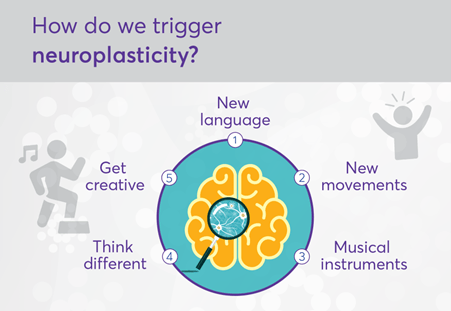- Home
- Mind & body
- Brain basics: what is neuroplasticity and how can it help keep your amazing brain healthy?
At CBHS we help you manage your health challenges. We believe in offering you the services, support and tools you need to live your best life.
Our Better Living Programs are available to support eligible members towards a healthier lifestyle. Each Better Living Program is subject to its own eligibility criteria.
Contact us for more information and to confirm your eligibility for a program.
Brain basics: what is neuroplasticity and how can it help keep your amazing brain healthy?

One of the most incredible and complex parts in the human body, the brain is approximately 1.3kg of intelligence, memory, body movement and behavioural control. And as we get older, there are things we can do to keep our brains healthy – like
memory games or learning to play an instrument.
In this article, you’ll learn about some brain basics, as well as how to look after this amazing organ throughout your life.
What is good brain health?
According to the World Health Organisation, good brain health is a
state of optimal cognitive, emotional, psychological and behavioural brain function. This state allows us to better cope with life situations and function at our best from day to day.
However, several factors can adversely affect our brain health including:
- physical health conditions such as diabetes, obesity and high blood pressure
- mental health conditions such as depression and bipolar disorder
- head injuries
- stress and anxiety
- insufficient sleep
- smoking.
Think you know about the brain and its development?
Think again! A lot of what you might believe about the brain and how it develops may be based on sayings like:
- “You can’t teach an old dog new tricks.”
- “I’ve finished growing.”
- "It’s all downhill from here.”
- “Our brain stops developing at 25.”
It’s true that our brains reach their full size by the time we’re adults, much like our bodies stop growing taller. However, growth and development are two different things. So, even after it’s done growing, your brain can continue to mature well into your 20s. In fact, the prefrontal cortex – the front part of your brain – is the final region to mature.
This area is responsible for:
- planning
- impulse control
- prioritising.
“The brain is like your body’s control centre. Even after it stops growing, it continues to mature.”
What is neuroplasticity?
A good way to look at this scientific term is by breaking it down. Plasticity refers to an object’s capacity to be shaped, moulded or altered. And ‘neuro’ refers to the nervous system. Put them together, and neuroplasticity means our brain’s ability to adapt or change over time by creating new neurons (brain cells) and building new connections.
Let’s try a quick experiment…
Cross your arms the way you’ve probably done hundreds of times. This is an easy and familiar thing to do, right? You don’t even have to think about it.
Now, cross your arms the other way – perhaps with your left arm over right. Does it feel unfamiliar and maybe a little awkward? You might also have to think about it longer to make it happen. This is because you’ve practiced it one way your entire life, creating a pattern you follow automatically.
This is a very simple demonstration of how the pathways in your brain are established and set. And neuroplasticity is the ability to “rewire our brain.” We can tap into this ability by learning new things and developing new skills that set up new neural pathways.

Why is neuroplasticity important?
Chances are we all have a family member or know someone who’s experienced the cognitive decline associated with Alzheimer's disease or another form of dementia. Some brain research suggests we can harness neuroplasticity to slow down the onset (and possibly even reverse) the debilitating symptoms of brain disorders.
And much like the way we exercise to help keep our heart, muscles and bones healthy, learning new skills can help to keep our brains in optimal condition.
How to tap into neuroplasticity
You’ve probably heard the expression, ‘A change is as good as a holiday’ and doing something different or new for your brain can also have a positive impact. Learning a new skill is a great way to harness the brain’s ability to
rewire itself.
Typically, this involves using your memory while working on something novel, such as:
- studying a new language
- going to a dance class and learning a routine
- beginning a meditation practice to still your mind
- learning a new skill like a musical instrument.
You can also do something you already know how to do but in a different way, like baking a batch of healthy cookies using an unfamiliar method. Remember, doing something ‘novel’ is the name of the brain game when it comes to neuroplasticity!
“Neuroplasticity is your brain’s capacity to continue changing in response to life’s experiences.”
It’s never too late to have a healthy brain
Whether you’re navigating your teens or stepping into your sixties, your brain can be a source of amazing power and agility. To keep your brain limber and up to the tasks of remembering, learning new skills and coping better with life’s challenges,
you need to keep it active.
And that’s something you can start right now just by trying something new. Time to dust off that old piano?
All information contained in this article is intended for general information purposes only. The information provided should not be relied upon as medical advice and does not supersede or replace a consultation with a suitably qualified healthcare professional.
Sources:
https://www.cbhs.com.au/mind-and-body/blog/boost-your-brain-power-by-working-smarter-not-harder
https://brainfoundation.org.au/healthy-brain/
https://www.ncbi.nlm.nih.gov/pmc/articles/PMC5035135/
https://hr.mit.edu/static/worklife/youngadult/brain.html#text
https://www.ncbi.nlm.nih.gov/books/NBK557811/
https://florey.edu.au/about/news-media/explainer-nature-nurture-and-neuroplasticity
https://www.cbhs.com.au/mind-and-body/blog/gingerbread-cookies-with-a-healthy-twist
Health and wellbeing
programs & support
You Belong to More with CBHS Hospital cover:
- Greater choice over your health options including who treats you
- Get care at home with Hospital Substitute Treatment program
- Free health and wellbeing programs to support your health challenges
Live your healthiest, happiest life with CBHS Extras cover:
- Benefits for proactive health checks e.g. bone density tests, eye screenings
- Keep up your care with telehealth and digital options
- Save on dental and optical with CBHS Choice Network providers
